16 if 引导的真实条件句
if引导的条件状语从句和宾语从句

If的用法if 的条件从句分为真实条件从句和虚拟条件从句。
真实条件从句:真实条件从句适用于主将从现,是假设有可能发生的。
一.位置在if 引导的条件状语从句中,既可以放在主句之前,也可以放在主句之后。
若if 条件句放句首,从句后面要加逗号,和主句隔开。
You will catch the bus if you get up early。
= If you get up early, you will catch the bus.二.时态1.(主祈从现)主句:一般现在时态(包含祈使句和含有情态动词can, may, must等的句子)从句:一般现在时态2。
(主将从现)主句:一般将来时态从句:一般现在时态3.从句:现在进行时,主句:一般将来时If you are looking for Peter you'll find him upstairs. 如果你是在找彼得,上楼就会找到他。
4.if从句用现在完成时,主句用一般将来时If you have finished dinner I’ll ask the waiter for the bill。
如果你吃完了,我就叫服务生来算账5。
if 条件句谈论的是重复发生和预示要发生的情景和事件,则主从句大多用一般现在时态。
如:If bears are in danger ,they attack people.三.注意事项1.在if 引导的条件状语从句中,当主句是一般将来时态时,不能使用be going to 结构,而要用will。
2.在if 引导的条件状语从句中,不能使用some,而要用any.四.同义句转化1.借助于祈使句+an d∕or+简单句转化,and表示顺承,or表示转折。
例如:(1)If you work hard, you’ll pass the exam.Work hard,and you’ll pass the exam.(2)If you do n’t hurry up,you’ll be late.Hurry up, or you'll be late。
if引导的条件句是什么从句

if引导的条件句是什么从句if 引导的条件句有真实条件句和非真实条件句两种;1、真实条件句:叙述真实可能发生的事情;例句:If you fail in the exam,you will let him down.如果你考试不及格,你会让他失望的。
扩展资料2、非真实条件句:虚拟语气的一种,表示与实际已发生事实相反:例句:If I were you, I would invite him.如果我是你,我会邀请他。
3、另一个常用连词为unless,大多数时候意思与 if not 相近:例句:Let's go out for a walk unless you are too tired.我们出去散步吧,除非你太累了。
例句:If you are not too tired, let's go out for a walk.如果你不太累,我们出去散步吧。
条件状语从句的基本用法1、用if引导:if意为“如果”。
例句:If you cheat in the exam you’ll never get away with it.考试作弊必予追究。
2、用unless引导:unless的意思是“如果不”“除非”。
例句:Unless you go at once you will be late.如果你不马上走,就会迟到的'。
3、用as [so] long as引导:as [so] long as的意思是“如果”“只要”。
例句:I’ll remember that day as long as I live.只要我活着,我就不会忘记那个日子。
4、用in case引导:in case用连词引导条件状语从句时,其意为“如果”“万一”。
例句:In case I forget, please remind me about it.万一我忘记,请提醒我一下。
5、条件状语从句的时态:当主句为将来时态或含有将来意义时,条件状语从句习惯上要用一般现在时表示将来意义,而不能直接使用将来时态。
虚拟语气讲解
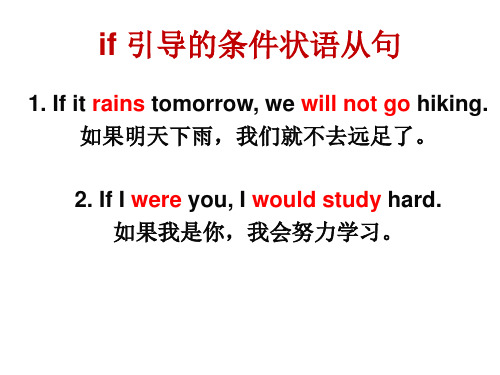
If I had a million dollars now, I would…
如果我有一百万美元,我会为我的家人买一座别墅。 If I had a million dollars now, I would buy a villa(别墅) for my family. 如果我有一百万美元,我会环游世界。 If I had a million dollars now, I would travel around the world. 如果我有一百万美元,我会去购物。 If I had a million dollars now, I would go shopping. 如果我有一百万美元,我会把它捐给慈善机构。 If I had a million dollars now, I would donate it to a charity organizaall match We would have won the match 如果杰克踢进那个球(score that goal), 如果我们还有多几分钟,
如果我们更加刻苦地训练,
如果本(Ben)把球传给了乔(Joe), 如果有成千的球迷为我们尖叫(scream for us), 如果我死死的盯住球(take one’s eyes off sth), 如果我前个晚上不熬夜(stay up late), 如果我们没有掉以轻心(take it easy), 如果我们没有精疲力竭(run out of), 我们本来是会得冠
虚拟(非真实)条件句 主句
与现在 事实相 反的假 设 与过去 相反的 假设
If+主语+动词的过去式 (动词be用were)
主语+should/
If+主语+had +过去分词
if条件状语从句的用法_If引导的条件状语从句

if条件状语从句的用法_If引导的条件状语从句很多英语学习者都觉得If引导的条件状语从句这个句型很难,学习起来很吃力。
下面是小编为你整理的If引导的条件状语从句的相关资料,希望大家喜欢!If引导的条件状语从句用法1.if引导的条件状语从句可以放在主句之前,也可以放在主句之后,如果放在主句之前,中间要用逗号将主句和从句隔开。
例如:If I am free, I will come to see you.= I will come to see you if I am free.如果我有空,我就来看你。
2. 在含if引导的条件状语从句的复合句中,主句用一般将来时,从句通常用一般现在时态表示将来意义,即主将从现原则。
例如:If it snows tomorrow, we will go skiing.如果明天下雪,我们就去滑雪。
3. 在含if引导的条件状语从句的复合句中,语句的谓语还可含有情态动词can、must、may等,主句也可是祈使句。
例如:If it stops raining, we can go out.如果雨停了,我们就能出去。
4. 在含if引导的条件状语从句的复合句中,如果主句部分描述的是客观事实或真理,要用一般现在时。
例如:If you heat the ice, it turns into water.如果你加热冰,它就会变成水。
if引导的非真实条件句对过去的虚拟条件从句(if):主语+had done 主句might/would/should/could+have done 对现在的虚拟if+ 主语+动词过去式(be用were)主句might/would/should/could+do对将来的虚拟if+主语+动词过去式(be用were)或主语+should do或主语+were to do主句might/would/should/could+doe.g.Tom got to the station in time because he started earlier.If Tom had started late, he would have missed the train.Do you think the thief entered through the door?No, if he had, I don't believe, he would have broken the living room window.If the book weren't so expensive, I would buy it.If you didn't live so far away, we would be able to visit you more.What would you do if you lost your passport in a foreign country?Why hasn't he come? If he should not come on time, we would have to put off the trip.2.注意事项e.g.If she hadn't work hard at English in the past, she wouldn't work as well as a secretary in a large company now. 混合时间的虚拟语气从句为对过去的虚拟,主句是现在。
if引导的条件句中的虚拟语气
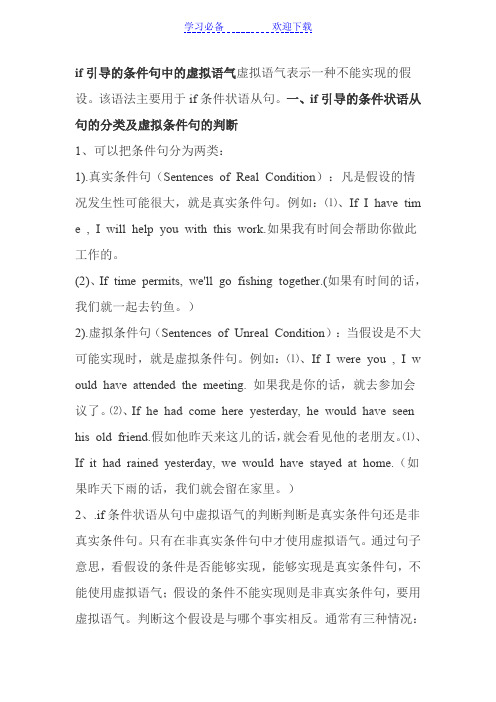
if引导的条件句中的虚拟语气虚拟语气表示一种不能实现的假设。
该语法主要用于if条件状语从句。
一、if引导的条件状语从句的分类及虚拟条件句的判断1、可以把条件句分为两类:1).真实条件句(Sentences of Real Condition):凡是假设的情况发生性可能很大,就是真实条件句。
例如:⑴、If I have tim e , I will help you with this work.如果我有时间会帮助你做此工作的。
(2)、If time permits, we'll go fishing together.(如果有时间的话,我们就一起去钓鱼。
)2).虚拟条件句(Sentences of Unreal Condition):当假设是不大可能实现时,就是虚拟条件句。
例如:⑴、If I were you , I w ould have attended the meeting. 如果我是你的话,就去参加会议了。
⑵、If he had come here yesterday, he would have seen his old friend.假如他昨天来这儿的话,就会看见他的老朋友。
⑴、If it had rained yesterday, we would have stayed at home.(如果昨天下雨的话,我们就会留在家里。
)2、.if条件状语从句中虚拟语气的判断判断是真实条件句还是非真实条件句。
只有在非真实条件句中才使用虚拟语气。
通过句子意思,看假设的条件是否能够实现,能够实现是真实条件句,不能使用虚拟语气;假设的条件不能实现则是非真实条件句,要用虚拟语气。
判断这个假设是与哪个事实相反。
通常有三种情况:①与过去事实相反。
②与现在事实相反。
③与将来事实可能相反。
3、“后退一步法”后退一步法是指在准确地判断了该句与哪一事实相反后,按虚拟语气的后退一步法处理从句谓语动词的时态。
if引导的条件句

If…
Find the rule (1)
It will be sunny tomorrow.
Find the rule (1)
We will have a picnic tomorrow.
We will have a picnic tomorrow. It will be sunny tomorrow. We will have a picnic if it’s sunny tomorrow.
angry
A:What will you do if you are angry? B: I will… if I am angry. keep quiet/play basketball/fight/…
( A )1. You should have a rest____ you are tired.
tired
A:What will you do if you are tired? B: I will… if I am tired. go to bed/have a rest/listen to musi:
What will you do if you have a lot of money one day?
sad
A: What will you do if you are sad? B: I will… if I am sad. cry/talk to my parents/sleep/…
Fill in the blanks with the words given.
will help 1. If you help others, everyone _________( help) you. eats 2. If he ___________ (eat) much meat, he’ll be heavy. will read rains 3. If it_______ (rain), she _____________ (read) books at home. 4. If you play computer games too much, you _________ (be) tired. will be bring 5. If you _________(bring) snacks to school, the teacher will take them away.
新概念二Lesson 16 A Polite Request最全知识点总结

Lesson 16 A Polite Request◆Warm up1、if条件状语从句◆Listening1. Was the request rude or polite?2. When did the writer find a polite note on his car?3. What did the traffic policeman want him to do?4. Can anyone fail to obey a request like this or not?◆Vocabulary● park [pɑ:rk] v. 停放(汽车)⑴n. 公园An amusement park 游乐园industrial park 工业区⑵v. 停放(汽车); parker n. 停放汽车的人parking area 停车场No parking here! 这里禁止停车parking lot 露天停车场parking ticket/fine 违规停车罚单/罚款park oneself (俚语) 坐下● traffic [ˈtræfɪk] n. 交通、通信量【记忆】traffic = tr(树)+aff(一份份)+ic(ic卡)→树上一份份包有IC卡的礼物落到交通警察的头上。
【搭配】traffic accident 交通事故、车祸traffic congestion 信号拥挤、通信号拥挤traffic jam 塞车traffic light 红绿灯heavy traffic 繁重的交通【例句】Little traffic was to be seen on the streets. 街上车辆很少。
● ticket [ˈtɪkɪt] n. 交通违规罚款单、票【记忆】ticket = tick (打钩) + et (已踢) →打钩的已踢,被贴上交通违规罚款单【搭配】movie ticket 电影票air ticket 飞机票a one-way ticket 单程票 a round-trip ticket 双程票/往返票a paring ticket 违规停车罚单have tickets on oneself 自高自大、自负【例句】The price of a single ticket is thirty-nine pounds. 单程票的价格是39英镑。
if引导的条件状语从句讲解
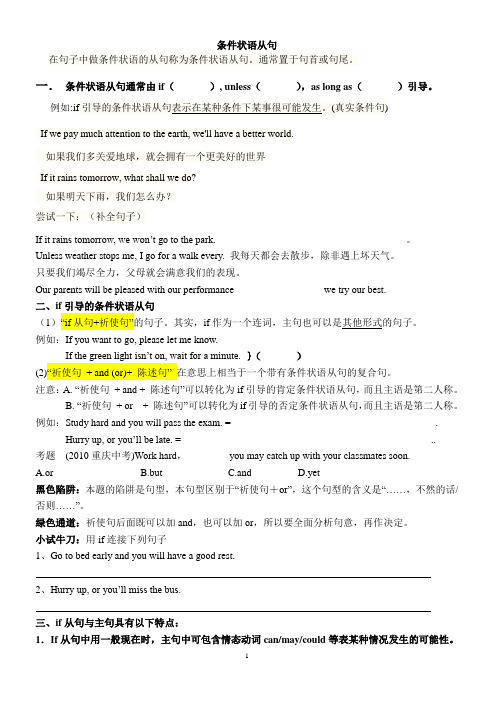
条件状语从句在句子中做条件状语的从句称为条件状语从句。
通常置于句首或句尾。
一.条件状语从句通常由if(), unless(),as long as()引导。
例如If we pay much attention to the earth, we'll have a better world.如果我们多关爱地球,就会拥有一个更美好的世界If it rains tomorrow, what shall we do?如果明天下雨,我们怎么办?尝试一下:(补全句子)If it rains tomorrow, we won’t go to the park.______________________________________。
Unless weather stops me, I go for a walk every. 我每天都会去散步,除非遇上坏天气。
只要我们竭尽全力,父母就会满意我们的表现。
Our parents will be pleased with our performance _____ _____ ______ we try our best.二、if引导的条件状语从句(1)“if从句+祈使句”的句子。
其实,if作为一个连词,主句也可以是其他形式的句子。
例如:If you want to go, please let me know.If the green light isn’t on, wait for a minute.}()(2)“祈使句+ and (or)+ 陈述句” 在意思上相当于一个带有条件状语从句的复合句。
注意:A. “祈使句+ and + 陈述句”可以转化为if引导的肯定条件状语从句,而且主语是第二人称。
B. “祈使句+ or + 陈述句”可以转化为if引导的否定条件状语从句,而且主语是第二人称。
例如:Study hard and you will pass the exam. =_________________________________________.Hurry up, or you’ll be late. =__________________________________________________..考题(2010重庆中考)Work hard,________ you may catch up with your classmates soon.A.orB.butC.andD.yet黑色陷阱:本题的陷阱是句型,本句型区别于“祈使句+or”,这个句型的含义是“……,不然的话/否则……”。
新概念英语第一册-语法练习(六)

新概念英语第一册语法练习(六)新概念英语语法解析:从句从句:宾语从句,定语从句(限定性),表语从句,状语从句(if引导的真实条件句)13 宾语从句:如果宾语从句的主句中的动词为过去时,那么宾语从句中的时态要和主句统一;如果宾语从句为疑问词引导,那么语序要用陈述语序,即主语在前,动词在后。
14 定语从句:15 表语从句:16 状语从句(if引导的真实条件句):主句用一般将来时,从句用一般现在时What will you do if you win a lot of money?If it rains tomorrow, I will stay at home.26 动词不定式做宾语及宾语补语的用法(详细用法请见NECII)结构:to do,用法:可以做除谓语以外的所有成分,语法上称之为非谓语动词。
做宾语:在一些动词后常用不定式做宾语,例如:want, like, ask ,try…做宾补:want sb. to do, ask sb. to do, like sb. to do…练习题典型不定式考题分析1. All of them try to use the power of the workstation ________ information in a more effective way.A. presentingB. presentedC. being presentedD. to present【解析】D。
此题考查use sth to do sth结构,意为“用……做某事”,其中的不定式为宾语补足语。
句意为:他们都试图用工作站的力量来更有效地展示信息。
又如:People use a knife to cut things. 人们用刀切东西。
The boy used the box to keep his toys in. 这男孩用这个箱子装他的玩具。
2. We are invited to a party ________ in our club next Friday.A. to be heldB. heldC. being heldD. holding 【解析】A。
If条件句

3.与过去事实相反的虚拟条件句 构成 条件状语从句 主句
If + 主语 + 动词过去完成 主语+ would, should, could, might+ have + 式 过去分词
例如 If there had been no air in the tube, the result would have been better.
某英文网站正在开展关于“高一是否该分文理科”的讨论。 请你根据下面所给的要点提示,用英语写一篇短文, 描述目前存在的两种看法,并陈述你的观点,以便向该网 站投稿。 赞成分科的人认为1. 可集中精力学习;2. 减轻学习压力; 3. 学自己喜欢的学科。 反对分科的人认为1. 学科知识受限制;2. 影响个人素质提 高; 3. 对科目缺乏深入了解。你的观点…… 注意:1.词数:120词左右; 2.参考词汇: 素质:quality n. 分科:division n. 全面的:all-round adj. 3. 短文的开头已给出,不计入词数。
I.虚拟语气用在条件状语从句中 虚拟语气用在条件状语从句中,通常从句由连词if 引导。 1.与现在事实相反的虚拟条件句 条件状语从句 If +主语 +动词过去 式(be的过去式用 were) 主句 主语+ would, should, could, might+动词原形
例 If I feared death, I wouldn’t be a Party member. 怕死就不做共产党员。 If there were no air, we couldn’t live. 如果没有空气,我们就不能生活。
if 引导的条件句 if引导的条件句表示在某种条件下,会导致另 一事发生。句式为if从句+ 主句。 中文意思是“如果某事发生(或不发生), 另一事就(不)发生”。通常分以下两种情形: 一、真实条件句 二、虚拟条件句
if条件句中的时态应用
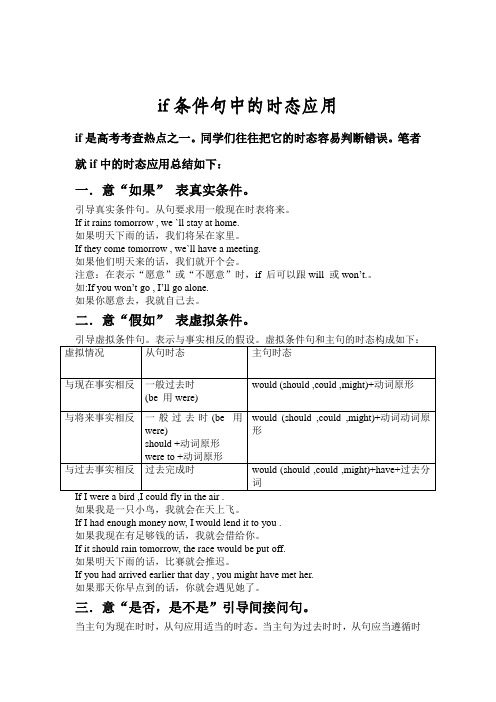
if条件句中的时态应用if是高考考查热点之一。
同学们往往把它的时态容易判断错误。
笔者就if中的时态应用总结如下:一.意“如果”表真实条件。
引导真实条件句。
从句要求用一般现在时表将来。
If it rains tomorrow , we `ll stay at home.如果明天下雨的话,我们将呆在家里。
If they come tomorrow , we`ll have a meeting.如果他们明天来的话,我们就开个会。
注意:在表示“愿意”或“不愿意”时,if 后可以跟will 或won’t.。
如:If you won’t go , I’ll go alone.如果你愿意去,我就自己去。
二.意“假如”表虚拟条件。
如果我是一只小鸟,我就会在天上飞。
If I had enough money now, I would lend it to you .如果我现在有足够钱的话,我就会借给你。
If it should rain tomorrow, the race would be put off.如果明天下雨的话,比赛就会推迟。
If you had arrived earlier that day , you might have met her.如果那天你早点到的话,你就会遇见她了。
三.意“是否,是不是”引导间接问句。
当主句为现在时时,从句应用适当的时态。
当主句为过去时时,从句应当遵循时态一致的原则,要采用相应的过去时态。
I don’t know if they will come tomorrow.我不知道他们明天是否会来。
He asked if they would come the next day.他问他们第二天是否会来。
注意:在正式的文件中,若句中有助动词had 、were 、should,则将其提前,省略if.Had it not been for your help,we would not have achieved so much.要不是你的帮助,我们不会取得如此大的成绩。
九年级语法复习-if引导的条件状语从句&虚拟语气

5. You’re always tired .If you_________( not go) to bed so didn’t go late every night , you wouldn’t be tired all the time.
wouldn’t wait would go 6. If I were you ,I _____________(not wait). I ________
Hale Waihona Puke 1. 如果我有一百万美圆,我就会买
一栋大房子.
had a million dollars If I _________________________, I would buy a big house __________________________.
2. 如果我是你, 我就会去那里.
were you would go there If I __________, I _______________.
3. 如果我有一架飞机,我就会环游世 界 had a plane If I __________________, I would travel all over the world _____________________________.
Thanks !!
permission ___________. (permit)
3. Last year, the company won nine ________ (million) dollars. million
4. If I _________ (fail) the exam, my parent would not take failed me to KFC.
if引导真实条件句时态用法

if引导真实条件句时态用法
当if引导真实条件句时,一般使用一般现在时态来表示一个普遍的真实情况或状态。
例如:
- If it rains, the ground gets wet.(如果下雨,地面就会湿。
)
- If I eat too much, I feel full.(如果我吃太多,我就会觉得饱。
)
- If you work hard, you will succeed.(如果你努力工作,你就能成功。
)
然而,有时也可以使用一般过去时态来表示过去的真实条件。
这通常发生在间接引语中,当主
句是过去时态时。
例如:
- She said that if it rained, they would cancel the picnic. (她说如果下雨的话,他们会取消野餐。
)总的来说,使用一般现在时态来引导真实条件句是最常见的用法。
if 引导的条件句

if 引导的条件句if引导的条件句表示在某种条件下,会导致另一事发生。
句式为if + 从句,主句。
中文意思是“如果某事发生(或不发生),另一事就(不)发生”。
通常分以下两种情形:一、真实条件句1. if从句和主句都用一般现在时,表示客观真理或习惯和持续发生的事情。
如:If the moon goes near the earth, the tide goes high. 如果月亮离地球距离近,潮水就高。
2. if从句用一般现在时,主句用一般将来时,表示从句中的动作如果发生,那么主句中的动作也将发生。
如:If it stops raining later this afternoon, we will eat out. 如果今天下午晚些时候雨能停,我们就出去吃饭。
3. if从句用一般现在时,主句用祈使句,表示给某人提建议或命令某人做某事,及提出建议或请求。
如:If you are not likely to be in town, please let me know. 如果你不可能在城里,请让我知道。
二、虚拟条件句虚拟条件句,也称非真实条件句,表示在某种假想的条件下,将导致某事发生。
从句中所陈述的事情仅仅只是说话者的想法,不是事实,也不可能发生。
1. if从句用一般过去时(did / were),主句用would / could / should / might + do,表示现在不可能发生的事情,if 从句中所陈述的事情与现在的事实相反。
如:If I were Liu Xiang, I would train hard for the 2008 Olympic Games.如果我是刘翔,我会为了2008年奥运会努力训练。
2. if从句用一般过去时(did / were或were to + do),主句用would / could / should / might + do。
表示将来不可能发生的事情,if 从句中所陈述的事情与将来的事实相反。
初中英语If引导的条件状语从句
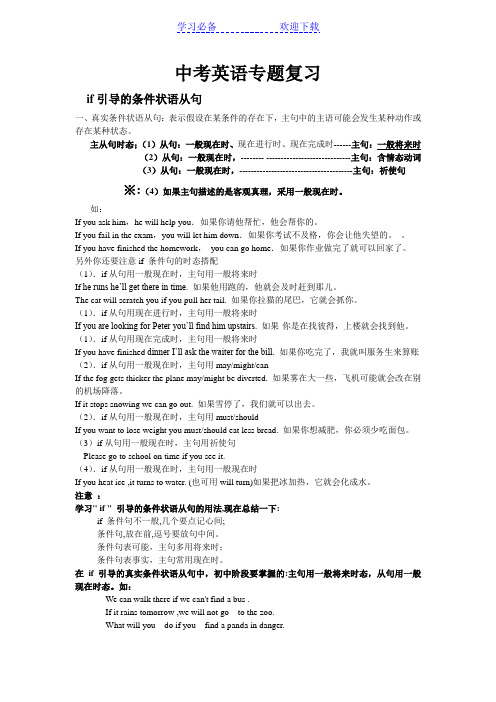
中考英语专题复习if引导的条件状语从句一、真实条件状语从句:表示假设在某条件的存在下,主句中的主语可能会发生某种动作或存在某种状态。
主从句时态;(1)从句:一般现在时、现在进行时、现在完成时------主句:一般将来时(2)从句:一般现在时,-------- -----------------------------主句:含情态动词(3)从句:一般现在时,---------------------------------------主句:祈使句※:(4)如果主句描述的是客观真理,采用一般现在时。
如:If you ask him,he will help you.如果你请他帮忙,他会帮你的。
If you fail in the exam,you will let him down.如果你考试不及格,你会让他失望的。
If you have finished the homework,you can go home.如果你作业做完了就可以回家了。
另外你还要注意if 条件句的时态搭配(1).if从句用一般现在时,主句用一般将来时If he runs he’ll get there in time. 如果他用跑的,他就会及时赶到那儿。
The cat will scratch you if you pull her tail. 如果你拉猫的尾巴,它就会抓你。
(1).if从句用现在进行时,主句用一般将来时If you are looking for Peter you’ll find him upstairs. 如果-你是在找彼得,上楼就会找到他。
(1).if从句用现在完成时,主句用一般将来时If you have finished dinner I’ll ask the waiter for the bill. 如果你吃完了,我就叫服务生来算账(2).if从句用一般现在时,主句用may/might/canIf the fog gets thicker the plane may/might be diverted. 如果雾在大一些,飞机可能就会改在别的机场降落。
if来引导的句子

"if" 是英语中的一个条件状语从句的引导词,它通常用来表示某个条件下的结果或假设。
以下是一些使用 "if" 引导的句子示例: 1. "If you study hard, you will pass the exam." (如果你努力学习,你会通过考试。
)
2. "If it rains tomorrow, we will stay at home." (如果明天下雨,我们会呆在家里。
)
3. "If the car breaks down, we will have to walk." (如果车坏了,我们只能走路。
)
4. "If I had more time, I would finish the project." (如果我有更多的时间,我会完成这个项目。
)
5. "If you want to succeed, you must work hard." (如果你想成功,你必须努力工作。
)
请注意,"if" 引导的从句通常放在主句之后,并且使用逗号与主句分隔。
例如:
"I will go to the party if my friend is going too." (如果我的朋友也去,我会去参加派对。
)。
五年级英语条件句构造高级分析判断单选题30题

五年级英语条件句构造高级分析判断单选题30题1.If it rains tomorrow, we _____ stay at home.A.willB.wouldC.shouldD.must答案:A。
本题考查if 引导的真实条件句中,主句用一般将来时,从句用一般现在时。
选项B“would”一般用于虚拟语气;选项C“should”表示应该;选项D“must”表示必须,均不符合语境。
2.If I have time, I _____ help you with your homework.A.willB.wouldC.shouldD.must答案:A。
同理,if 引导的真实条件句,主句用一般将来时。
选项B“would”用于虚拟语气;选项C“should”应该;选项D“must”必须,都不符合。
3.If you study hard, you _____ get good grades.A.willB.wouldC.shouldD.must答案:A。
if 引导的真实条件句,主句一般将来时。
选项B“would”虚拟语气;选项C“should”应该;选项D“must”必须,不合题意。
4.If she _____ early, she can catch the bus.A.gets upB.got upC.will get upD.would get up答案:A。
if 引导的真实条件句,从句用一般现在时。
选项B“got up”过去时;选项C“will get up”将来时;选项D“would get up”用于虚拟语气,均不正确。
5.If we _____ late for school, the teacher will be angry.A.areB.wereC.will beD.would be答案:A。
if 引导的真实条件句,从句一般现在时。
选项B“were”用于虚拟语气;选项C“will be”将来时;选项D“would be”虚拟语气,均不合适。
- 1、下载文档前请自行甄别文档内容的完整性,平台不提供额外的编辑、内容补充、找答案等附加服务。
- 2、"仅部分预览"的文档,不可在线预览部分如存在完整性等问题,可反馈申请退款(可完整预览的文档不适用该条件!)。
- 3、如文档侵犯您的权益,请联系客服反馈,我们会尽快为您处理(人工客服工作时间:9:00-18:30)。
if 引导的真实条件句
真实条件句
真实条件句用于陈述语气,假设的情况可能发生,其中if 是如果的意思。
句式为(if + 从句,+主句)。
中文意思是“如果某事发生(或不发生),另一事就(不)发生”。
主句:即句子的主体,能单独使用或出现的句子
从句:是复合句中不能独立成句,但具有主语部分和谓语部分
主将从现:主句将来时(一般将来时、将来进行、祈使句),从句现在时(一般现在、现在进行、现在完成)
祈使句表示对别人将来的请求、命令、建议等等
祈使句可以用语气词“吧”作结尾,也可以不用语气词。
祈使句无主语, 主语常省去。
真实条件句
1. if从句和主句都用一般现在时,表示客观真理或习惯和持续发生的事情。
如:
If the moon goes near the earth, the tide [taid] goes high. 如果月亮离地球距离近,潮水就高。
2. if从句用一般现在时,主句用一般将来时,表示从句中的动作如果发生,那么主句中的动作也将发生。
如:
If it stops raining later this afternoon, we will eat out. 如果今天下午晚些时候雨能停,我们就出去吃饭。
3. if从句用一般现在时,主句用祈使句,表示给某人提建议或命令某人做某事,及提出建议或请求。
如:
If you are not likely [ˈlaikli] 可能的to be in town, please let me know. 如果你不可能在城里,请让我知道。
注意:
1)在真实条件句中,主句不能用be going to表示将来,该用shall, will. 2)表示真理时,主句不用shall (will) +动词原形,而直接用一般现在时的动词形式。
